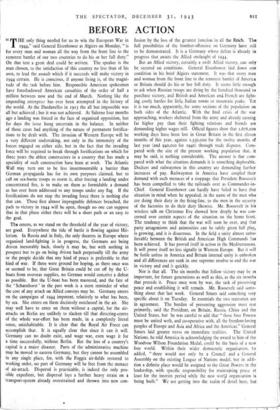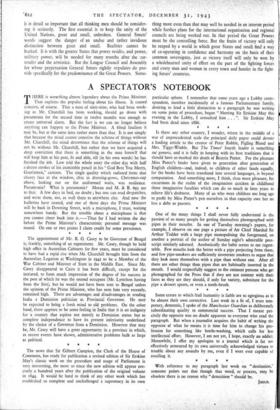BEFORE ACTION
cc THE only thing needed for us to win the European War in 1944," said General Eisenhower at Algiers on Monday, " is for every man and woman all the way from the front line to the remotest hamlet of our two countries to do his or her full duty." On that text a great deal could be written. The speaker is the man chosen, to the satisfaction of this country no less than of his own, to lead the assault which if it succeeds will make victory in 1944 certain. He is conscious, if anyone living is, of the magni- tude of the task before him. Responsible American spokesmen have foreshadowed American casualties of the order of half a million between now and the end of March. Nothing like the impending enterprise has ever been attempted in the history of the world. At the Dardanelles in 1915 the all but impossible was all but achieved ; but it was not achieved. At Salerno four months ago a landing was forced in the face of organised opposition, but for days the issue hung uncertain in the balance. In neither of those cases had anything of the nature of permanent fortifica- tions to be dealt with. The invasion of Western Europe will be a very different undertaking, not only in the immensity of the forces engaged on either side, but in the fact that the invading force will be required to break through fortifications on which for three years the ablest constructors in a country that has made a speciality of such construction have been at work. The Atlantic Wall may turn out to be less insurmountable a barrier than German propaganda has for its own purposes claimed, but to call on sea-borne troops to storm it, after forcing a landing under concentrated fire, is to make on them as formidable a demand as has ever been addressed to any troops under any flag. If the fortifications do not stop the invading force there is nothing else that can. Those first almost impregnable defences breached, the path to victory in 1944 will be ,open, though no one can suppose that in that phase either there will be a short path or an easy to the goal.
The omens, as we stand on the threshold of the year of victory, are good. Everywhere the tide of battle is flowing against Hit- lerism. In Russia and in Italy, the only theatres in Europe where organised land-fighting is in progress, the Germans are being driven inexorably back, slowly it may be, but with nothing in prospect but to go on being driven back perpetually till the army or the people decide that any kind of peace is preferable to .that kind of war. If there were ground for hoping, as there once was or seemed to be, that Great Britain could be cut off by the U- boats from overseas supplies, no German would conceive a defeat as possible. But the U-boat has been mastered, and the fate of the Scharnhorst ' in the past week is a stern reminder of what the cost of any attack on Allied convoys may be. Germany enters on the campaigns of 1944 impotent, relatively to what has been, by sea. She enters on them decisively outclassed in the air. She may well have to enter on them without a capital, for the air- attacks on Berlin are unlikely to slacken till that directing-centre of the whole war-effort has been made, in a completely literal sense, uninhabitable. It is clear that the Royal Air Force can accomplish that. It is equally clear that since it can it will. Germany can no doubt exist, and wage war, even wage it for a time successfully, without Berlin. But the loss of a country's capital is a major disaster. Parts of the administrative machine may be moved to eastern Germany, but they cannot be assembled in any single place, for, with the Foggia air-fields restored to working order, no part of Germany will be free from the menace of air-attack. Dispersal is practicable, is indeed the only pos- sible expedient, but dispersal lays a further heavy strain on a transport-system already overstrained and thrown into new con- fusion by the loss of the greatest junction in all the Reich. The' full possibilities of the bomber-offensive on Germany have still to be demonstrated. It is a Germany whose defeat is already in progress that awaits the Allied onslaught of 1944.
But an Allied victory, certainly a swift Allied victory, can only be secured on conditions. General Eisenhower laid down one condition in his brief Algiers statement. It was that every man and woman from the front line to the remotest hamlet of America or Britain should do his or her full duty. It seems little enough to ask when Russian troops are dying by the hundred thousand to purchase victory, and British and American and French are fight- ing costly battles for little Italian towns or mountain peaks. Yet it is too much, apparently, for some sections of the population on both sides of the Atlantic. With the final crisis of the war approaching, workers sheltered from the army and already earning far higher pay than their fighting relations and friends are demanding higher wages still. Official figures show that 1,676,00o working days have been lost in Great Britain in the first eleven months of this year, against 1,530,000 for the twelve months of last year (and 940,000 for 1940) through trade disputes. Com- pared with the size of the present working population that, it may be said, is nothing considerable. The answer is that com- pared with what the situation demands it is something deplorable. Dockers and railwaymen in this country are demanding further increases of pay. Railwaymen in America have coupled their demand with such menaces of a stoppage that President Roosevelt has been compelled to take the railroads over as Commander-in- Chief. General Eisenhower can hardly have failed to have that situation in mind when he appealed, in the name of the men who are doing their duty in the firing-line, to the men in the security of the factories to do their duty likewise. Mr. Roosevelt in his wireless talk on Christmas Eve showed how deeply he was con- cerned over certain aspects of the situation on the home front. The tendency to think that the war will soon be over, and that party antagonisms and animosities can be safely given full play, is growing, and it is disastrous. In the field a unity almost unbe- lievable between the British and American High Commands has been achieved. It has proved itself in action in the Mediterranean. It will prove itself no less signally in Western Europe. But it will be futile unless in America and Britain internal unity is unbroken and all differences are sunk in one supreme resolve to end the war in victory and end it quickly.
Nor is that all. The six months that follow victory may be as important, for future generations as well as this, as the six months that precede it. Peace once won by war, the task of preserving peace and establishing it will remain. Mr. Roosevelt said some- thing about that last week. General Smuts said something very specific about it on Tuesday. In essentials the two statesmen are in agreement. The burden of preventing aggression must rest primarily, said the President, on Britain, Russia, China and the United States, but he was careful to add that " those four Powers must be united with, and co-operative with, all the freedom-loving peoples of Europe and Asia and Africa and the Americas." General Smuts laid greater stress on immediate realities. The United Nations, he told America in acknowledging the award to him of the Woodrow Wilson Foundation Medal, could be the basis of a new free world. Within their wider democratic organisation, he added, " there would not only be a Council and a General Assembly on the existing League of Nations model, but in addi- tion a definite place would be assigned to the Great Powers in the leadership, with specific responsibility for maintaining peace at least for the interim period while the new world organisation is being built." We are getting into the realm of detail here, but































 Previous page
Previous page